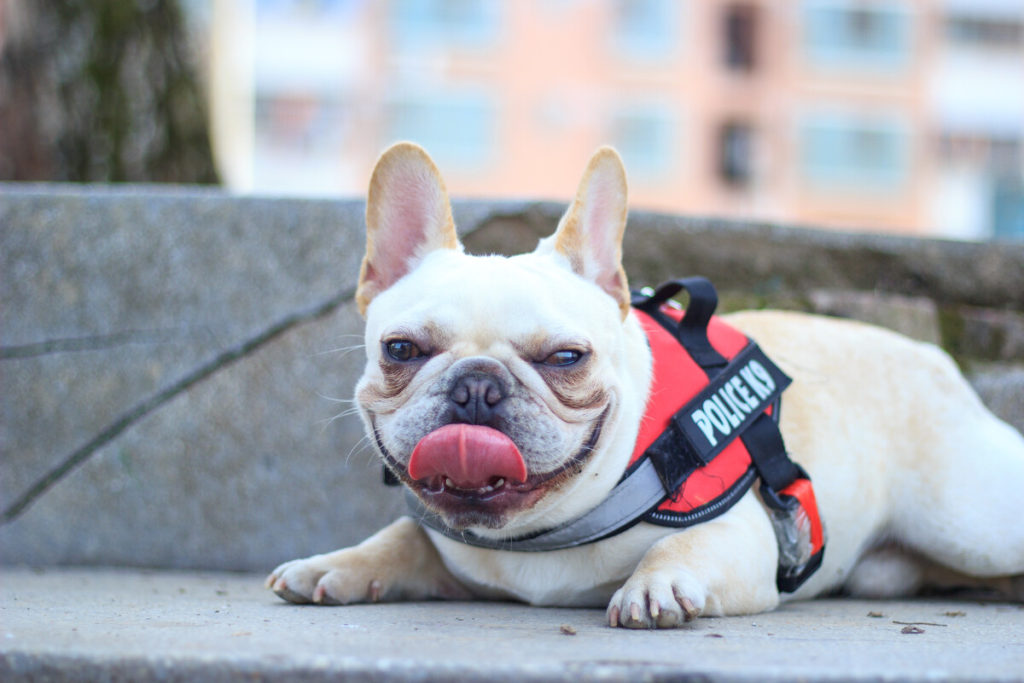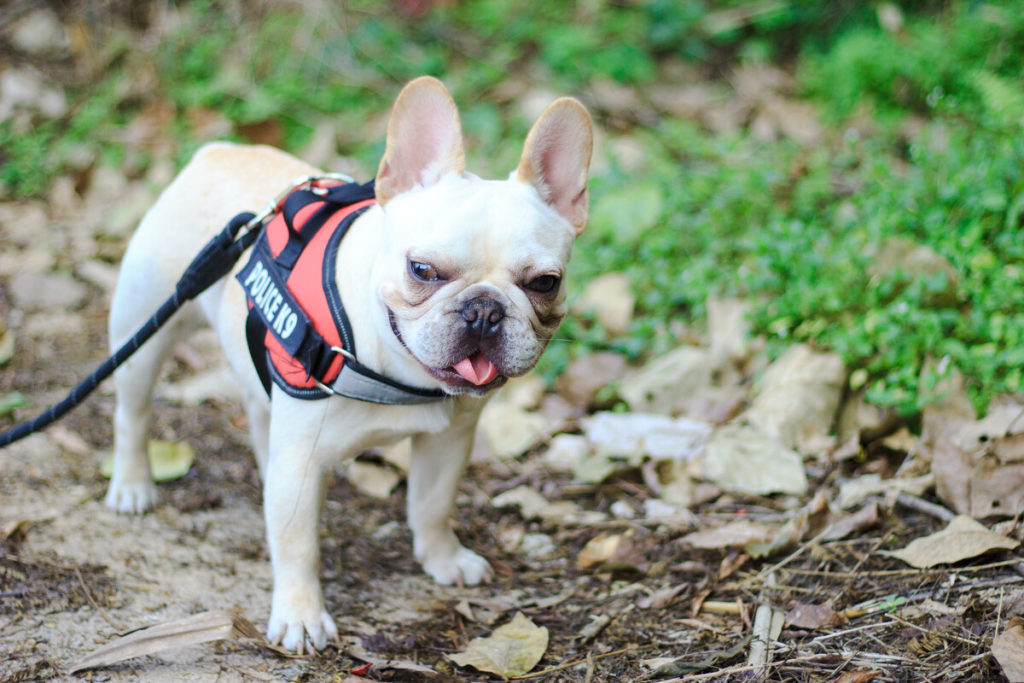Just like humans, French bulldogs can get stressed. Stress is usually evident through body language, and is sometimes expressed audibly. Here’s the top 17 signs that your French bulldog might be stressed.
Signs That Your French bulldog is Stressed
- Aggression
The most common sign of stress or anxiety in French bulldogs is signs of aggression. This can be either towards its owner, towards other people or to other animals. A French bulldog displaying signs of aggression is usually quite obvious in its body language and behavior.
French bulldogs are generally a social breed and aren’t usually an aggressive breed, so showing aggressive tendencies that are out of the norm for your French bulldog are definitely a red flag.
A prime example of aggressive body language is when your French bulldog raises the corner of its lips, showing more teeth than usual. This can be accompanied by growling.

If your French bulldog is left in a stressful situation without the trigger being separated from your French bulldog, the aggression can manifest into more serious issues, such as biting.
- Avoidance
It is natural for dogs to want to have some degree of time alone, whether it be on their dog bed, or in their crate as it gives them a sense of safety. Having said that, French bulldogs were bred for and live for companionship.
If you notice that your French bulldog is constantly avoiding you, or other people, and this is uncharacteristic of them this could be a sign of stress. This could be avoiding eye contact or constantly wanting to be isolated, hiding behind objects, e.g. behind a chair or sofa, under a table or bed etc.
- Loss of Appetite
A sudden loss of appetite can also be an indicator that your French bulldog is stressed. It is very uncharacteristic of French bulldogs to lose interest in their food
They may also show behavior similar to the symptoms of eating disorders such as bulimia or anorexia, and this can be accompanied by a significant loss in body weight over a short period of time.
- Excessive or abnormal panting
Panting itself is not necessarily a sign of stress in your French bulldog. Panting helps regulate body temperature in dogs similar to how humans sweat to cool down.
Can be a sign of heat stress, look for signs of overheating and do everything you can to help them cool down. French bulldogs and other brachycephalic breeds are particularly prone to overheating which can lead to heat stroke in serious cases.

Other than heat stress, excessive panting can also be caused by emotional stress. This is referred to as ‘behavioral panting’ and is usually present with other body languages characteristic of anxiety or stress.
- Excessive licking
You may have noticed your French bulldog repeatedly licking its lips from time to time. Again similar to panting, some degree of this behavior is normal, however if observed in excess can indicate emotional distress such as stress or anxiety.
This is usually in the form of licking the lips, in a repetitive manner. and behaviorists say this is an “appeasement gesture”, which in other words is intended as a calming signal to indicate that they are not a threat. For example, if your French bulldog is approached by a big German Shepherd, they may become nervous and start licking their lips to soothe the interaction and make peace.
- Whale eye
Whale eye refers to a canine body language whereby the eyes become widened, to the point that the sclera (or the whites of the eyes) around the pupils become visible.
Dogs do this when they are stressed, anxious, threatened or just uncomfortable in general. Whale eye is often accompanied by other related body language signs including a stiff facial expression, a closed mouth and ears drawn back.
Due to the nature of French bulldogs’ skull shape, this may cause the eyes to become quite significantly bulged, and vulnerable. Extra precaution should be taken to make sure that they don’t pop out in this more vulnerable state.
- Whining or whimpering
If your French bulldog could talk, it would be much easier to decipher what it is they are trying to communicate with you. As with barking, whining or whimpering is another way that French bulldogs vocalize in order to communicate to us.
There can be many reasons why your French bulldog is whining or whimpering. If you notice that your French bulldog is whining while displaying other traits of fear such as trembling in the body, the whimpering may be as a result of fear and nervousness.

Another one that unfortunately happens from time to time, is when you accidentally step on your French bulldog’s paw, and they whimper in pain. This is usually a loud, sharp, high-pitched yelp. Make sure to give them plenty of affection in apology!
Other reasons for whining and whimpering in French bulldogs is when they want something from you (i.e. some of your dinner), or they are asking for your attention.
- Frequent yawning
We often pass off yawning as simply a sign of tiredness or sleepiness. However in dogs this is not always the case.
Dogs may yawn as a reaction to stress or nervousness, especially when they are placed in an uncomfortable situation. If you notice that your French bulldog is yawning more than usual and in a repetitive manner, take a look at the situation they’re in and analyse where stress could be coming from. This could be being placed around too many strangers, around a more dominant dog, or being in an unfamiliar environment.
Look at their body language for more signs of abnormal behavior that could indicate stress, to help determine whether they are uncomfortable or wanting to take a nap.
- Excessive shedding
Although French bulldogs are heavy shedders all year round, when they are stressed they can shed excessively, more than normal. You should be accustomed to your French bulldog’s shedding levels and therefore should be able to tell when they are shedding more they usually do.
If you do notice an evidently unusual amount of shedding from your French bulldog, this may be a sign that they are emotionally burdened by stress or anxiety. Like humans, stress triggers certain hormones to be released, and thus causing a hormonal imbalance that is related to the increased level of shedding. This is a natural biological response to stress and can be observed but not prevented.
- Excessive barking
Barking is an instinctive behaviour in dogs and is considered normal. However French bulldogs typically aren’t a yappy breed, and generally won’t bark excessively.
This can be due to several reasons:
- As an alarm signal. French bulldogs are actually quite alert and have a strong sense of hearing to accompany their strong-smelling ability. They will notice even the slightest of sounds of a stranger approaching your home. Your French bulldog may be warning you of an intruder, so make sure to act accordingly.
- Stress-induced by separation anxiety. If your French bulldog starts barking excessively as they notice you about to leave the house, this is more likely than not due to the fear of being left alone. You may need to consult a dog behavior consultant to address separation anxiety issues.
- Change in sleeping habits
You should be accustomed to your French bulldog’s sleeping routine, whether your French bulldog is a heavy sleeper or a really heavy sleeper.

If you notice an unusual disturbance to your French bulldog’s sleeping habits, this could be an indicator that your French bulldog is stressed.
This can go either way. Your French bulldog loves taking naps during the day and sleeps like a baby at night, but one day you notice they have trouble sleeping and are restless in bed as if they were nervous about something.
Conversely, they are overly lethargic and sleep alot more than usual. If you notice that your French bulldog is sluggish, and appear to be lacking in energy, this could also mean they are under some sort of stress. Lethargy is often a symptom that something is wrong with your dog, can be a deeper underlying medical issue at hand.
- Destructive chewing
The next sign of stress in your French bulldog is destroying objects and furniture around the house, mainly by chewing them to pieces. This is particularly related to separation anxiety, and you will notice this when you come home to a complete mess of a home where everything in sight has been chewed up.
They will chew when left alone to relieve the stress as it takes their mind off the fact that they are without their human. This is often accompanied by other symptoms of separation anxiety including whining and whimpering, excessive barking, and so on.
Apart from the excessive chewing that occurs when your French bulldog experiences its puppy teething phase, this behavior can also be seen in adult French bulldogs. Usually, this is an indicator of stress, as chewing for dogs is stress relieving behavior.

By chewing on objects, it not only occupies the thoughts to distract them from the stress trigger but also relieves anxiety. Fear and separation anxiety are the two main factors for stress-related destructive chewing in French bulldogs.
Boredom can also become a factor that causes destructive behavior. Ensure that your French bulldog gets enough mental and physical stimulation to avoid boredom.
- Change in bodily functions
In more extreme cases of stress, your French bulldog that is usually well toilet trained exhibits a lack of bowel and/or bladder control.
Particular as a reaction to fear, a sudden release of related hormones will cause the muscles in the bladder to relax, resulting in an accidental loss of control of urine release.
- Digestive issues
If you’re noticing symptoms of digestive issues such as diarrhea, constipation, flatulence, vomiting or constipation in your French bulldog, this can be caused by anxiety or stress. This is due to a rise in hormones such as adrenaline that arises when under emotional distress.
- Shaking or trembling
Shaking or trembling in the body are quite noticeable symptoms that can indicate that your French bulldog is stressed. The body shake is similar to when your French bulldog just gets out of a bath, feeling refreshed and free, and shakes this off along with the excess water on the coat. Trembling is more directly related to fear, similar to in humans.
- Pacing or circling
Repetitive actions such as pacing or circling without a clear purpose are also symptoms of canine stress. This is usually linked with anxiety, which can be induced by several factors, including:
- Fear, e.g. from a loud thunderstorm
- A stressful environment (e.g. being surrounded by strangers)
- Being in a claustrophobic environment, with not enough room to move around, such as inside a closed crate
- A lack of mental and/or physical stimulation
- Loss of enthusiasm
Another sign of stress in French bulldogs is a loss of enthusiasm. This entails a general sense of apathy; loss of enthusiasm and interest in things that once were of interest, such as playing fetch, playing with toys or doing tricks for treats, going on walks, on drives or interest in people dogs or food.

Reasons Why Your French bulldog Might Be Stressed
French bulldogs are very sensitive dogs and can take on stress from their environment. Here are some of the most common reasons that your French bulldog is stressed:
1.A drastic change of environment. For example, if you’re moving home this can be a quite stressful process as everything your French bulldog has been familiar with has now changed to a completely new environment, and they now have to adapt to a new home, with new smells, and new surroundings. This can also be due to the loss of a family member, whether a human or another canine buddy.
2.Change of routine. Dogs are very routine animals and thrive when sticking to a standard schedule throughout the day. This includes their exercise, naps, meals, and bedtime. A drastic and sudden change in their routine can cause anxiety and stress
3.Lack of stimulation.A lack of either mental or physical stimulation is another common cause of stress. Make sure that your French bulldog gets enough stimulation, whether it be through exercise, use of toys, or even training new skills.
4.Loud noises. French bulldogs are very alert to sound. to lots of different sounds outside and inside the home. Loud noises such as a thunderstorm or fireworks can lead to fear-induced stress.

5.Separation anxiety. Separation anxiety is also another big reason why your French bulldog may be stressed. Being a very companionship heavy breed, French bulldogs tend to suffer from separation anxiety and this can be quite emotionally distressing for both you and your French bulldog. If you notice that your French bulldog’s whining intensifies whenever you are about to leave the house, this is most likely the cause. There are techniques you can use to manage and minimize separation anxiety.
6.Post Traumatic Stress Disorder (PTSD). French bulldogs can suffer trauma from an event earlier in their life, whether this is abuse from a previous owner, a car accident, or other traumatic experience. Certain things can trigger traumatic memories, such as a certain smell or noise. If you have a rescue French bulldog, it helps to know the history of whether he was treated with proper love and affection.
7.Uncomfortable situations.If your French bulldog is being forced to endure an uncomfortable situation, this can lead to significant stress. There are many examples of such uncomfortable situations.
- Dogs in general don’t like the feeling of being trapped. This can happen when you show them too much love and give them a tight hug; your French bulldog won’t like this and will likely try to escape.
- For some reason, French bulldogs tend to hate when they have to get their nails clipped. It maybe the experience of being restrained, having their paws touched, or the feeling of having their nails clipped. Use positive reinforcement and treats to make it a fun experience rather than a stressful one.
- French bulldogs don’t tend to enjoy swimming. This could be due to the fact they aren’t designed to swim efficiently, and therefore their survival instincts kick in. If you force your French bulldog into the deep end of a pool without taking the proper steps to teach them slowly, this can cause stress. Some French bulldogs learn to enjoy swimming, it all depends on the individual.
- A trip to the vet can also be a stressful experience, and you may notice they shed heavily when you pick them back up to take them home.

Treatment: How to Relieve Your French bulldog’s Stress and Anxiety
- Learn to read your French bulldog’s body language. This will allow you to more easily identify when they are stressed and narrow down the trigger causing the stress. Once you have identified the stress trigger, remove the stressor from the environment or remove your French bulldog from the environment if possible. Sometimes the cause of stress is more obvious than others. Look for clues, what your French bulldog is looking at, and what are the unusual circumstances in the situation.
- Don’t force your French bulldog to face the situation. Contrary to what some dog owners believe, when forced to face stressful situations, dogs won’t overcome their fears, rather will become more stressed, aggressive fearful and even traumatized
- There may be a pathological condition underlying the emotional distress. If you find your French bulldog is constantly stressed without improvement, or you are having trouble isolating the stressor, visit your vet to help get a diagnosis. They may recommend either behavior training therapy, prescription medicine or a combination of both.
- Let them have some time alone. Be careful not to over-compensate by giving them too much affection upfront. Wait until their signs of aggression disappear. Give them a ‘safe haven’; a place for them to their favorite crate, blanket, pillow, dog bed, with their favorite toy
- Ensure they get sufficient mental and physical stimulation. Play with your French bulldog and give them regular exercise as this alone can be a great stress reliever. Play a game of fetch, take them to the dog park to socialize with other people and other dogs, and give them toys to play with.
- Keep your own stress levels down. Dogs can sense the energy of their owners and tend to mimic the energy that of their owners. You may need to de-stress yourself first.
- Training to overcome fears. How this is done will depend on what the trigger is. Get the help of a professional dog trainer.
- Prevention. Avoid certain environments that you can control that are known to cause your French bulldog stress, such as loud crowded places full of strangers and other dogs.
- If your French bulldog does have an accident due to stress, avoid harsh punishments as punishments don’t work with dog training. Positive reinforcement is key.
- Use a dog anxiety wrap. These are jackets that are specifically designed to calm anxiety, fear, and over-excitement in dogs. They work by applying constant gentle pressure over your French bulldog’s body. Great for use in situations such as during a thunderstorm. Check out the Thundershirt (click here to check the price on Amazon).




